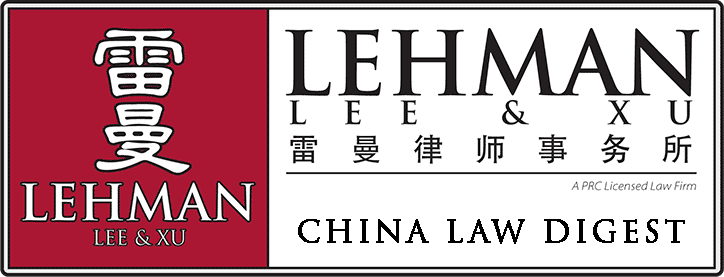
 |
LEHMAN, LEE & XU |
China Law Digest |
March 2012 |
The China Law News keeps you on top of business, economic and political events in the China. |
|
|
In the News |
| Beijing to Complete Microblog Real Name System by March |
|
A spokesperson for the Beijing Internet Propaganda Management Office announced in a recent press conference that Beijing aims to complete mandatory real name registration for microblog platforms by March 16. The Office has also established a microblog development expert advisory group composed of experts from Tsinghua University, China University of Political Science and Law, the People's Daily Online's Public Opinion Testing Center, China Labs, and the Data Center of the China Internet (DCCI). |
| Chinese company launches trademark suit against Apple |
|
SHENZHEN - A Shenzhen-based enterprise has accused technology giant Apple of infringing on its iPad trademark - a trademark over which both companies claim ownership. The Pudong district court in Shanghai will hear the case on Feb 22, a lawyer for the Chinese company told China Daily on Monday. A fine of 240 million yuan (S$47.4 million) against Apple over the infringement is also pending from the market administrative authority in Beijing. "We are asking the court to order Apple to stop selling and marketing the iPad in China. We also demand an apology," said Xie Xianghui, a lawyer representing the Chinese company. The company, Proview Technology Shenzhen, also took two authorized Apple resellers for iPad - Gome Electrical Appliances and the Sundan Electronic Store - to courts in Guangdong province over similar infringements. No financial compensation has been demanded by Proview Shenzhen at this stage of the trials. Verdicts are pending. Proview Shenzhen registered the iPad trademark in China in 2001, nine years before Apple launched its iPad products in 2010, Xie said. Proview Taiwan, a company associated with, but not legally representing, the Shenzhen company, sold the Chinese trademark - along with others for use in other countries - to the UK-based IP Application Development Limited for 35,000 British pounds ($55,000) in 2009, according to a report by Nanfang Daily. The UK company then resold the brand to Apple for 10 pounds before Apple's launch of iPad in 2010, the report said. Apple applied to transfer the trademark from Proview Shenzhen on the Chinese mainland in 2010, but the application was turned down by China's trademark administrative authorities, the report said. Apple then sued Proview Shenzhen in 2011 to gain legal entitlement as exclusive user of the iPad name - but lost the lawsuit in a Guangdong court. The higher court in Guangdong province accepted Apple's appeal. The general office of the Xicheng district branch of Beijing Administration for Industry and Commerce told China Daily it is "investigating the cases", but refused to verify or comment on the bill on Monday. An insider who refused to be named told China Daily that law enforcement officials from other branches of the Beijing administration had listened to Xicheng's report on the case. "But many of us hold different opinions on whether it is Apple breaching Proview Shenzhen's rights or Proview Shenzhen dishonestly demanding compensation. We didn't reach consensus on the fine as well." The public relations office of Apple China did not respond to China Daily's interview request by press time on Monday. Liu Yinliang, an associate law professor at Peking University, said if the trademark management authority had not approved such an intellectual property transfer, then the trademark deal had not yet become valid in China. Web link: http://news.asiaone.com/News/Latest%2BNews/Digital1/Story/A1Story20120207-326384.html
|
| Province mulls law on radioactive pollution control |
|
LANZHOU - Northwest China's Gansu Province, home to the country's earliest nuclear base, plans to draft a new law on radioactive pollution control this year, the local government said Saturday. Lawmakers in the landlocked province decided to draft the new law at the provincial legislature's annual session last month, Gansu's environmental protection department said in a press release. The home to China's earliest nuclear test base, Gansu now has nearly 2,900 radioactive sources, more than 1,000 sets of radioactive facilities and a rapidly increasing exposure to electro-magnetic radiation. "It is therefore essential to step up legislation and lay out stricter standards on the treatment of radioactive waste to prevent potentially hazardous pollution," the document said. It is not immediately clear when the new law will be enacted. The environmental protection department said it will take the opportunity to propose another set of regulations to ensure that the electro-magnetic radiation from mobile phones, towers and other equipment across the province are within prescribed limits. Web link: http://www.chinadaily.com.cn/china/2012-02/11/content_14583564.htm |
| Chinese authorities reviewing Google, Motorola merger |
Summary: Google¡¯s acquisition of Motorola Mobility for $12.5 billion is under review by the Chinese Commerce Ministry, a rejection considered unlikely. A spokesman for the Chinese Commerce Ministry has announced that they are presently reviewing Google¡¯s purchase of Motorola Mobility.
|
| Legislators seek changes for migrants |
Suggestions include more training for skilled jobs |
| Legislative sessions open to press |
BEIJING - The upcoming annual national political sessions launched a press center on Sunday. |
|
|
|
|